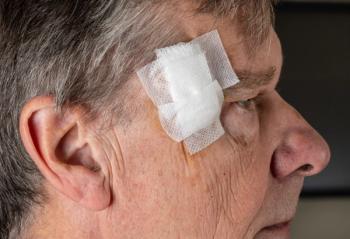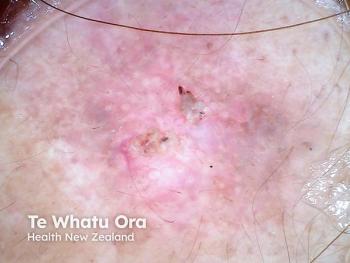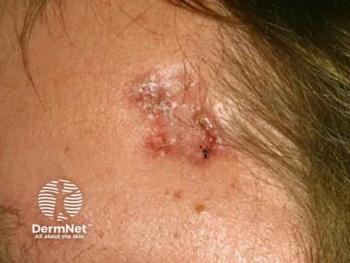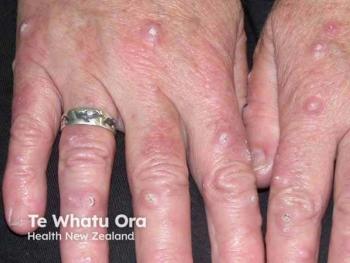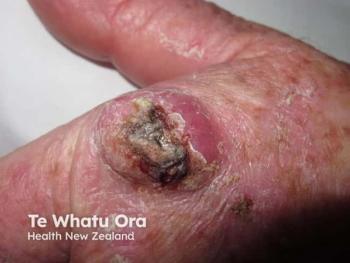
- Dermatology Times, September 2020 (Vol. 41, No. 9)
- Volume 41
- Issue 9
Emerging options for high-risk melanoma
Recruiting is ongoing for an investigator-initiated clinical trial of pembrolizumab in clinical stage 2B/C melanoma which will investigate the effects of treatment with pembrolizumab before surgery to remove melanoma on the rate of positive sentinel lymph nodes in patients with stage IIB/C melanoma.
Immunotherapy trial explores neoadjuvant approach
An ongoing study is attempting to build on what researchers have learned in recent years regarding neoadjuvant approaches to immunotherapy for high-risk melanoma.
With the increasing number of approved immunotherapies and targeted therapies for patients with stage 3 melanoma, accurate pathologic microstaging assumes increasing importance, says Giorgos Karakousis, M.D., associate professor of surgery at the Hospital of the University of Pennsylvania, Philadelphia.
“There have been ongoing discussions about the role and utility of sentinel lymph node (SLN) biopsy in patients with melanoma. But more so now than before, where a large part of the procedure’s value was prognostic, there is value in terms of helping guide decisions about effective adjuvant therapies,” he says.
Interest in neoadjuvant therapy — treatment before surgical excision — is growing.
“We’ve initiated studies here at Penn looking at that approach in patients with lymph node involvement, treating with immune checkpoint inhibitor therapy prior to surgical removal of the disease,” he says. “In an appreciable portion of those patients, we see a very good pathologic response of the tumor.”
In a study published in the March 2019
Presently, Dr. Karakousis and colleagues are recruiting for an investigator-initiated clinical trial of pembrolizumab in clinical stage 2B/C melanoma.2
“This will give us an opportunity to learn a lot more about what’s happening at the level of the sentinel lymph node in response to the immune therapy, which may give us important clues about which patients may benefit most from this approach,” he says.
Patients will undergo wide excision with SLN biopsy three weeks after the first pembrolizumab dose, followed by a year of pembrolizumab adjuvant therapy.
“The endpoint of the trial is to see if sentinel lymph node positivity rates are decreased in those patients receiving neoadjuvant treatment compared to historical controls,” he adds.
To identify viable biomarkers of response, investigators also will investigate several additional immune-related factors through gene expression analyses and characterization of the cellular changes within the SLN. The study is expected to complete accrual within two years.
DISCLOSURE: The ongoing study is supported by Merck, but Dr. Karakousis receives no personal funds from the company.
REFERENCE:
1 Huang AC, Orlowski RJ, Xu X, et al. A single dose of neoadjuvant PD-1 blockade predicts clinical outcomes in resectable melanoma. Nat Med. 2019;25(3):454-461.
2 Neoadjuvant PD-1 Blockade in Patients With Stage IIB/C Melanoma. ClinicalTrials.gov identifier: NCT03757689. Updated July 14, 2020. Accessed August 2020. https://clinicaltrials.gov/ct2/show/NCT03757689
Articles in this issue
over 5 years ago
Will OSHA cite me for requesting employees not wear masks?over 5 years ago
How safe are cosmetics?over 5 years ago
Pretreatment punch technique guides safe injectionover 5 years ago
What we know (and don’t) about dietary effects on skin agingover 5 years ago
Microbiome-based treatments not ready for prime timeover 5 years ago
Phenotypes inform management optionsover 5 years ago
AI has potential to improve melanoma detectionover 5 years ago
Autoantigen array identifies IgG4 anti-gliadin autoantibodyNewsletter
Like what you’re reading? Subscribe to Dermatology Times for weekly updates on therapies, innovations, and real-world practice tips.

